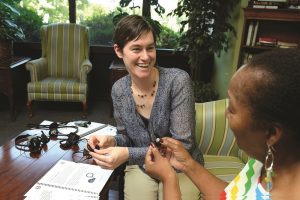“That type of accessibility is what this is all about — reaching and helping people who haven’t been helped before.”
Carrie Nieman Founder, Access HEARS
Johns Hopkins UniversityEst. 1876
America’s First Research University
Imagine you’re one of the 23 million older Americans living with untreated hearing loss. Maybe you don’t have easy access to a doctor, or you can’t afford a traditional hearing aid — which can cost anywhere from $3,000 to $5,000. Are there other options available to you?
Carrie Nieman, MD, MPH, a postdoctoral research fellow in the Center on Aging and Health and a resident in Otolaryngology-Head and Neck Surgery at the Johns Hopkins Hospital, offers an emphatic “Yes”.

With support from Johns Hopkins Technology Ventures — an initiative of the university to accelerate the commercialization of faculty and student discoveries and a priority of the Rising campaign — Nieman has shown that relatively cheap sound-amplification products, with in-home training and counseling, can improve quality of life for low- to moderate-income older adults.
She applied her discoveries to benefit real-world clients through her nonprofit, Access HEARS, a social enterprise she began developing as part of an early cohort of Johns Hopkins Technology Ventures’ Social Innovation Lab. Nieman’s business plan for Access HEARS earned her accolades and prize money that, along with the Social Innovation Lab seed funds, enabled her to develop the nonprofit as she collected data to further her research.
“It’s important to do research the right way, step by step — and we’re doing that,” says Nieman. Yet according to a 2001 study by the Institute of Medicine, it takes an average of 17 years to bring innovations from the lab to the public.
“It’s also important to start translating ideas early in the research process to the next step: How can we impact more people, faster?” asks Nieman.
Working collaboratively with community partners during its proof-of-concept process, Access HEARS held sessions in various senior living community centers around Baltimore. The programs included basic hearing screenings and offered an array of devices. The Access HEARS team fit attendees with their chosen device, taught them how to use it, and provided education around age-related hearing loss and communication strategies.
“That type of accessibility is what this is all about — reaching and helping people who haven’t been helped before.”
Carrie Nieman Founder, Access HEARS
After a three-month post-program survey of participants, Nieman’s research showed that Access HEARS’ clients reported lower levels of hearing handicap, as well as satisfaction and use comparable to standard — and more expensive — hearing aids. Additionally, more than 85 percent of the initial clients reported they would not be able to use their device as well without the program. Nearly two-thirds of this cohort indicated an interest in helping train future Access HEARS clients. At a recent “graduation ceremony” for Access HEARS participants, Nieman enjoyed witnessing the real-world impact of bringing research out of the lab and into the community through entrepreneurship.
“So many people stood up and said, ‘I have a new piece of technology that I’ve mastered and I use every day.’ That type of accessibility is what this is all about — reaching and helping people who haven’t been helped before.”
The Access HEARS is now developing a train-the-trainer program for those first-cohort alumni interested in serving as trainers in future programs. Meantime, she’s working to secure additional funding to support such programs, keeping an eye toward expanding within Baltimore and nationally.
“We’re seeking to connect with fellow entrepreneurs and potential collaborators committed to empowering older adults to live well,” says Nieman.
Interested in supporting innovators like Carrie Nieman through the Social Innovation Lab?
Topics: Johns Hopkins Medicine, Johns Hopkins Technology Ventures, Promote and Protect Health, Strengthening Partnerships